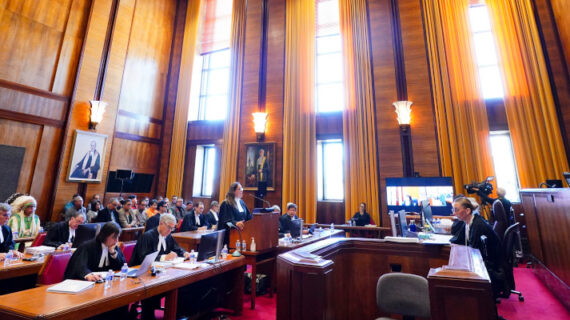- Israel's proposed judicial reforms would strengthen the government at the expense of the High Court.
- Israelis have held mass-demonstrations against the proposals for weeks. On March 27, the government paused passage of the legislation.
- Many Canadian Jews are concerned about how the reforms will change Israel. Others support the legislation.
The Israeli government’s recently proposed judicial reform sparked a wave of protests across the country which ultimately forced the government to press pause on the legislation.
Israeli protesters weren’t alone, though, as the reforms caused weeks of debate and protest among Jewish Canadians, on both sides of the issue.
The fiery reaction to the judicial reform bill was, in part, because its proposals were so consequential for the country, says Shimon Fogel, the chief executive officer of the Toronto-based Centre for Israel and Jewish Affairs.
“They challenge the status quo in fundamental ways that, in some respects, could change the complexion of the country,” says Fogel. “I don’t accept the proposition that it would make it less democratic, but it would shift the balance of power to elected officials.”
The reforms include enabling the Knesset to overrule High Court rulings with a majority vote and would boost the government’s power over who are selected to become justices of the High Court. Since January, the proposed legislation has sparked some of the largest protests in the country’s history.
The Jewish diaspora has reacted very strongly, with some of the largest Jewish advocacy organizations in North America expressing concern over the consequences of passing the proposed reforms. On March 27, the Israeli government announced it was postponing the legislation following the ongoing protests and strikes, a decision that was welcomed by the CIJA.
Fogel says the legislation contains aspects that are troubling to a large segment of Canada’s Jewish community, which he says supports Israel and wants to be part of the conversation about Israel’s future.
“For others, it’s about changing the elements of the character of the state in ways that don’t align with their own sense of what Israel should represent, and so that triggered a very strong reaction,” says Fogel.
However, opposition in the diaspora has not been unanimous. Michael Tzion, a Toronto resident, says that Israel’s High Court has been able to decide Israeli affairs without any foundation in Jewish tradition.
“Many, especially religious people, feel that this is getting out of hand, and they pushed…the government to reform the judiciary, which is a big obstacle in what many Israelis feel is the future of Israel,” says Tzion.
Tzion points out how Israel’s High Court ruled that hospitals cannot forbid visitors from bringing leavened bread products, which are non-kosher, into the facilities during Passover. The Court’s justices said bringing non-kosher food to a hospital for Passover comprises part of the fundamental right to individual autonomy and the religious freedom of Israeli citizens.
“Israel is founded on the idea that it’s a Jewish nation, and Judaism goes along with Jewishness. It’s not just a culture, it’s also a religion, it’s a people that have existed for thousands of years, and we need to continue those; culture, religion, traditions, whatever you want to call it,” says Tzion.
The demonstrations in Israel are a long-brewing revolt by the country’s secular residents against the growing influence of Israel’s ultra-Orthodox population, says University of Toronto professor Janice Stein.
Israel, which became a country in 1948, was governed by successive left-wing, secular governments until 1977. From the 1980s onwards, the Israeli political Left has seen its influence wane to the benefit of its more conservative rivals.
The Likud party, which has espoused economic liberalism and strengthening national security for most of its history, has led most of the governing coalitions since 1996. Most of these coalitions have been headed by Benjamin “Bibi ” Netanyahu, who became Israel’s longest-serving prime minister in 2019.

To form a parliamentary majority, Likud has become more reliant on parties of the religious Right, whose growth in political power has been concurrent with the rising numbers of ultra-Orthodox Israelis. Ultra-Orthodox Israelis can receive exemptions from Israel’s mandatory military service, which Stein says has resulted in a wave of anger and resentment.
“Many of the ultra-Orthodox community do not serve in the military. The exemption from service provokes resentment in a country with a small standing army that depends on its reserves,” says Stein.
Stein says a second issue fuelling the current protests is the emergence of the radical, nationalist Israeli political Right.
“The current government has parties that are the most right-wing and nationalist in Israel’s history. These parties support expanding settlements and much more extreme action against the Palestinian population,” says Stein.
Stein says the majority of Israel’s population, who are not ultra-Orthodox are concerned about both issues. Previous Likud-led coalitions have passed legislation favoured by the nationalist Right, including removing Arabic as an official language of Israel and expanding settlements in East Jerusalem and the West Bank, home to the majority of the Palestinian population.
Israel is one of the most developed countries in the world, and Tzion says it is one of the few such countries with a right-wing government.
“The majority of people there (in Israel) are more right-leaning, in a developed country, compared to most countries where generally the population is more left-wing,” says Tzion. “This shift is interesting because actually the foundation of Israel has always been left-wing, even socialist…so when Bibi arrived, that was a fundamental shift.”
Fogel says the judicial reform would put greater focus on the goals of the different constituencies that support the governing coalition.
“Opposition to it (the bill) is less about substance and more about the greater question of what will Israel look like, and the diminished role of those who have historically been in the primary or most influential, position,” says Fogel.
Tzion says there is a fight between the right-wing government with significant religious support and its opponents on the secular Left, and points out that much of the diaspora broadly aligns or falls into the latter category.
In 2021, Pew Research found that 71 percent of American Jews voted Democrat in 2020. On the whole, 69 percent of American Jews surveyed by Pew were part of the progressive Reform branch of Judaism, or not part of a particular branch at all. However, Pew also found that the vast majority of American members of the Orthodox branch, who comprised nearly 10 percent of all American Jews, voted Republican.




